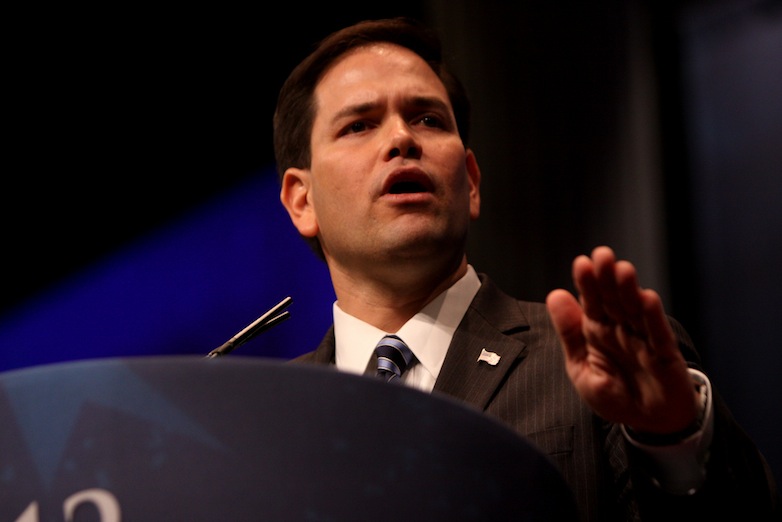What exactly has Marco Rubio done for Florida lately? Democratic Rep. Patrick Murphy put his finger on it. Since being elected to office in 2009, Rubio has merely used one of the state’s two Senate seats as a launch pad to higher office.
Check out Rubio’s biography here. Simply put, there’s not a lot of “there” there. What am I missing? For clues, I read a speech by Rubio on June 25, 2014 in Washington, DC. It’s more of the same Reaganite narrative we’ve come to expect from GOP politicians who talk the talk but don’t necessarily walk any walk, pontificating ideals we all share as American citizens but which have little to do with solutions from Congress or big business to actually reinvent the American middle class Dream for the 21st Century.
In the speech, the senator relies on anecdotes to describe economic remedies for normal people:
“Innovations will never come from the federal government’s rigid one-size-fits-all approach. So I have proposed combining our existing federal anti-poverty money into a Flex Fund that would be made available to the states, which have the ability to design innovative and targeted programs to address the unique needs of their residents… Liberals offer up increases in taxes and the minimum wage.”
Modern reforms are certainly needed. But the painful fallout from globalization and automation are systemic in nature, baked into buzz words we hear on television as gospel everyday, such as competitiveness and free markets. Millions of men and women over 40 and under 30 were radically displaced as a result of a financial crisis brought on by a runaway and corrupt banking and housing industry. Many of these older Americans live in Florida. I see them working at Wal-Mart and Macy’s to survive.
But Rubio’s Flex Fund and tax reform proposals, while at least admitting a role for government in addressing these issues, rely on fiscal policy (public finance) as a solution, making them dead-on-arrival for many of his Tea Party supporters. In fact on Fox News, Rubio will blame “government” (which is all of us in a democracy) for creating the problems he proposes state “government” should now fix. As a result, Americans continue to talk past each other and think political solutions come in only two flavors: black and white, right and left, conservative and liberal, etc. Fortunately, countries like Sweden and Vietnam have found ways to evolve without labels or ideological straitjackets, serving as positive examples of plans that are working.
To his credit, the son of Cuban parents co-authored a bipartisan immigration overhaul that would have provided a pathway to citizenship for undocumented U.S. workers. But unfortunately Rubio stepped back from it after the measure came under fire from establishment conservatives in his own party and Congress.
On educational reform, here’s what Rubio has to say:
“Established institutions control the (school) accrediting process. As a result, the entrenched higher education cartel has the power to block out innovative, lower-cost competitors. I have proposed that Congress establish a new, independent accrediting process designed to open the door for more innovative and affordable schools.”
Question: Putting the banking, health insurance and energy cartels aside for the moment, what about incentives to create worker-owned cooperatives and employee-owned companies as a way to produce what former President George W. Bush called an “ownership society” that would go beyond skills and narrow definitions of “labor”? Despite having Cuba, a real-life laboratory, less than 100 miles off the coast of Key West, Rubio is blinded by his anti-Castro rhetoric that poll after poll now show most Americans associate with an absurd and outdated economic embargo.
Rubio, a man in his 40s, is surprisingly out of touch with Main Street Florida on issues such as Obamacare (which has signed up more people in South Florida than anywhere else), same-sex marriage, climate change and medical marijuana.
The bottom line is Rubio’s ideological grandstanding has produced little progress on the ground. At the very least, Rubio may garner enough attention on the campaign trail to convince the party’s eventual presidential candidate – be it former Gov. Jeb Bush or Kentucky Sen. Rand Paul – that choosing him as a vice presidential running mate would capitalize on his ethnic heritage and most importantly, his claim to fame as a cultural offset to Hillary’s obvious appeal as potentially our first woman president.







